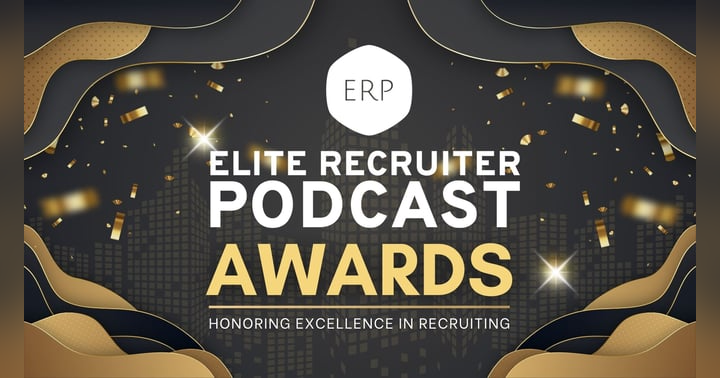Boosting Recruiting Sales: How to Finish the Year Strong

As the year winds down, it's crucial to ramp up your recruiting sales efforts to maximize performance and achieve your goals. This blog post, inspired by insights from the "Finish The Year Strong 2025" event and our recent podcast episode, provides actionable tips to help you boost your sales and finish the year on a high note. In our latest episode of The Elite Recruiter Podcast, Mastering the Sales Game: Tom Erb's Blueprint for Recruiting Success & Future-Proof Strategies, we delved into strategies for revitalizing your recruiting approach. This post expands on those concepts, offering practical steps to implement them effectively.
The Challenge: Reigniting Sales Efforts
In the ever-evolving world of recruiting, it's easy to become complacent, especially during periods of high demand. However, as the market shifts and competition intensifies, it becomes essential to reignite your sales efforts. Many recruiters relaxed their sales approaches when jobs were plentiful, but now is the time to build a robust pipeline of opportunities. The challenge lies in breaking old habits, embracing new strategies, and staying motivated as you push toward year-end goals.
Key Takeaway 1: Discover Unique Differentiators
One of the most crucial elements of successful recruiting sales is understanding and articulating your unique value proposition. In a crowded market, simply offering the same services as everyone else won't cut it. You need to identify what makes you different and communicate that effectively to potential clients.
Actionable Tip: Identifying Your Unique Value Proposition
To identify your unique value proposition, ask yourself the following questions:
- What specific problems do I solve for my clients? Go beyond generic answers like "finding talent." Dig deep into the specific challenges your clients face and how you address them. For example, do you specialize in sourcing candidates with niche skill sets? Do you offer customized recruiting strategies tailored to specific industries?
- What are my areas of expertise? Do you have deep knowledge of a particular industry or sector? Are you proficient in using specific recruiting technologies or tools? Highlight your expertise to demonstrate your value and build trust with potential clients.
- What is my track record of success? Share data and testimonials that highlight your achievements. Quantify your success by showcasing metrics such as placement rates, time-to-fill, and client satisfaction scores.
- What is my company culture and values? Today, many companies are looking for partners who align with their values and culture. Highlight your company's mission, values, and commitment to ethical recruiting practices.
- What is my personal brand and reputation? Your personal brand is a reflection of your expertise, values, and personality. Cultivate a strong personal brand by engaging in thought leadership, networking, and providing exceptional service to your clients and candidates.
Once you have a clear understanding of your unique value proposition, craft a compelling elevator pitch that articulates your differentiators and resonates with potential clients. Practice your pitch and be prepared to tailor it to the specific needs and interests of each prospect.
Key Takeaway 2: Implement a Structured Sales Process
A structured sales process is essential for consistent and predictable revenue generation. Without a clear process, you're likely to waste time on ineffective activities and miss out on valuable opportunities. A well-defined sales process provides a roadmap for guiding prospects through the sales cycle, from initial contact to closing the deal.
Actionable Tip: Integrating Technology for Efficiency
Technology can significantly enhance your sales process and improve efficiency. Here are some tools and technologies to consider:
- CRM (Customer Relationship Management) system: A CRM system is essential for managing your leads, contacts, and deals. It provides a centralized repository for all your sales-related information and helps you track your progress through the sales cycle.
- LinkedIn Sales Navigator: LinkedIn Sales Navigator is a powerful tool for identifying and connecting with potential clients. It allows you to target specific industries, job titles, and geographic locations.
- Email marketing automation: Email marketing automation tools can help you nurture leads and stay top-of-mind with prospects. Create automated email sequences that deliver valuable content and promote your services.
- AI-powered recruiting tools: AI-powered tools can automate many of the tedious tasks associated with recruiting, such as sourcing candidates, screening resumes, and scheduling interviews. This allows you to focus on more strategic activities, such as building relationships with clients and closing deals.
- Video conferencing tools: Video conferencing tools can help you conduct virtual meetings and presentations, which can save time and travel costs.
Integrate these technologies into your sales process to streamline your workflows, improve communication, and enhance your overall efficiency. Regularly evaluate your technology stack and look for opportunities to adopt new tools that can further improve your performance.
A structured sales process should include the following stages:
- Prospecting: Identifying and researching potential clients.
- Initial Contact: Reaching out to prospects and introducing your services.
- Needs Assessment: Understanding the client's hiring needs and challenges.
- Presentation: Presenting your solutions and demonstrating your value.
- Proposal: Providing a formal proposal outlining your services and fees.
- Negotiation: Negotiating the terms of the agreement.
- Closing: Securing the client's commitment and signing the contract.
- Onboarding: Successfully starting the relationship and delivering.
Develop a detailed sales playbook that outlines the steps involved in each stage of the sales process. Include templates, scripts, and best practices to ensure consistency and effectiveness. Train your team on the sales process and provide ongoing coaching and support.
Key Takeaway 3: Prepare for Future Growth
While it's important to focus on closing deals and finishing the year strong, it's also crucial to prepare for future growth. The recruiting industry is constantly evolving, and you need to stay ahead of the curve to remain competitive.
Actionable Tip: Maintaining Focus on Key Sales Areas
To prepare for future growth, maintain a consistent focus on the following key sales areas:
- New Business Development: Continuously seek out new clients and opportunities. Attend industry events, network with potential clients, and leverage social media to generate leads.
- Client Relationship Optimization: Nurture your existing client relationships and identify opportunities to expand your services. Regularly communicate with your clients, provide exceptional service, and proactively address their needs.
- Order Fulfillment: Ensure that you have the resources and capabilities to fulfill your clients' hiring needs efficiently and effectively. Invest in training and development to enhance your team's skills and knowledge.
- Market Research: Stay informed about industry trends, market conditions, and competitor activities. Conduct regular market research to identify emerging opportunities and potential threats.
- Technology Adoption: Embrace new technologies and tools that can improve your efficiency and effectiveness. Experiment with AI-powered recruiting tools, data analytics platforms, and other innovative solutions.
By maintaining a consistent focus on these key sales areas, you can position yourself for long-term success and navigate the ever-changing landscape of the recruiting industry.
Conclusion: Unlock Recruiting Success and Drive Revenue
Finishing the year strong in recruiting sales requires a combination of strategic planning, focused execution, and a willingness to adapt to changing market conditions. By discovering your unique differentiators, implementing a structured sales process, and preparing for future growth, you can unlock recruiting success and drive revenue. As we discussed in our podcast episode, Mastering the Sales Game: Tom Erb's Blueprint for Recruiting Success & Future-Proof Strategies, taking actionable steps now can lead to significant gains. Remember to stay persistent, embrace new technologies, and prioritize building strong relationships with your clients and candidates. By following these strategies, you can not only finish the year strong but also lay the foundation for continued success in the years to come.
Resources and Further Learning
To further enhance your recruiting sales skills and knowledge, consider the following resources:
- Industry conferences and events: Attend industry conferences and events to network with peers, learn about new trends, and gain insights from leading experts.
- Online courses and webinars: Enroll in online courses and webinars to develop specific skills, such as sales techniques, negotiation strategies, and technology adoption.
- Books and articles: Read books and articles on recruiting sales, marketing, and business development to stay informed about best practices and emerging trends.
- Mentoring and coaching: Seek out mentors and coaches who can provide guidance, feedback, and support as you navigate the challenges of recruiting sales.
- Professional associations: Join professional associations to connect with other recruiters, access valuable resources, and stay up-to-date on industry news.
By investing in your professional development and continuously seeking out new knowledge and skills, you can become a more effective and successful recruiter.










